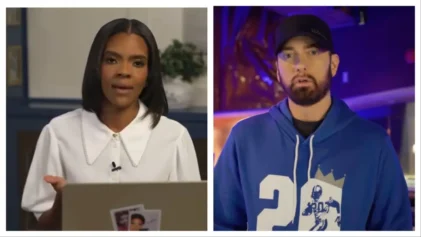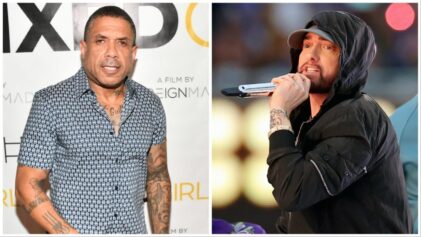After J. Cole’s album 2014 Forest Hills Drive leaked on Wednesday, the real topic of discussion became the jabs the hip hop star threw at white rappers who seem to be stealing the hip hop limelight from Black rappers.
All 13 of J. Cole’s tracks found their way to the web well before their intended December 9 release date and fans are buzzing about his “Fire Squad” track, which took aim at Iggy Azalea, Eminem, Macklemore and even Justin Timberlake.
“History repeats itself and that’s just how it goes,” he raps. “Same way that these rappers always bite each other’s flows/ Same thing that my ni**a Elvis did with rock ‘n’ roll/ Justin Timberlake, Eminem and then Macklemore.”
It was later in the verse that J. Cole imagined himself trying to be happy if he saw Australian rapper Iggy Azalea snatch a Grammy in the future.
“While silly ni**a argue over who gon’ snatch the crown/ Look around my ni**a, white people have snatched the sound,” he continues. “This year I’ll probably go to the awards dappered down/ Watch Iggy win a Grammy as I try to crack a smile.”
Although the rapper immediately states that he was just joking, he also added that “all good jokes contain true s**t” before rapping, “Same rope you climb up on. They’ll hang you with.”
This isn’t the first time J. Cole has questioned the importance of race when it comes to selling music.
On his track “Crooked Smile,” he ponders what type of success he might have seen if he was a white artist.
“Wonder why we inhale, cause we in hell already/ I ask if my skin pale, would I then sell like Eminem or Adele,” he raps on the song from his 2013 album Born Sinner.
It’s an argument that has long plagued the rap community—not about whether or not white rappers belong in hip hop but why they are catapulted to success for music that many argue is sub par compared to their Black counterparts.
There is perhaps no better example of this then when Macklemore went home with not one but four Grammys earlier this year, while Kendrick Lamar went home empty handed.
Social media was set ablaze with users who voiced their frustrations with Macklemore’s Grammy win and explained exactly where the frustrations were coming from.
“Let me clear this up RIGHT NOW,” an Atlanta party host tweeted. “Nobody is upset b/c a white man won a Grammy.”
A series of tweets that followed explained, “We mad that a less talented rapper (& I use that losley [sic] ) won BECAUSE he was white.”
The same argument has been applied to Iggy Azalea’s success.
Debates have been flying over why the white rapper is able to rap in a manner that got Nicki Minaj criticized early in her career but she is seeing great success with that same formula.
Many hip hop fans argue that if a Black female rapper delivered the same rather simplistic and predictable verses that fill Iggy’s music, she would struggle to find the same success.
Iggy has also never been the target of claims that her sexually explicit music makes her a poor role model for her young listeners – the same claims that have been launched at Beyonce, Nicki Minaj, Rihanna and more.
Meanwhile, J. Cole took the time to send a message out to the current top rappers in the game and urged them to start working more closely together rather than focusing on hip hop beefs over who has the “crown.”
“Who’s the king,” the question blares towards the end of the track. “We all kings.”
A distorted voice goes on to say that “there goes lil ol Jermaine” snatching the crown and destroying it rather than placing it on his own head.
He ends the track by saying that the message is for “all kings” because he knows “deep down every poet just wants to be loved.”


